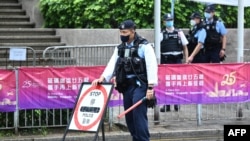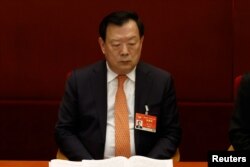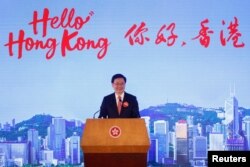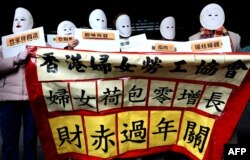A top Chinese official has told Hong Kong to "nip in the bud" any potential risks that might threaten national security and be vigilant of "destructive forces lurking in society," according to the city's Beijing-appointed leader.
On his return to Hong Kong after political meetings in the Chinese capital, Chief Executive John Lee said late Monday that China's top official in charge of Hong Kong affairs, Xia Baolong, told him to be on high alert for national security risks.
China has used a harsh national security law passed in 2020 to charge human rights activists and pro-democracy figures with serious crimes such as secession and subversion that carry penalties up to life in prison.
Xia, director of the State Council's Hong Kong and Macau Affairs Office, told Lee to focus on Hong Kong's economy, but also warned that "national security risks still exist and that some destructive forces are still lurking in society," Lee said.
"We should thwart any moves that would jeopardize national security, public peace or Hong Kong's safety, nipping them in the bud and not letting them grow," he told reporters.
On Tuesday, the new United Nations Human Rights Chief Volker Türk voiced concerns over the national security law that rights groups and western governments have denounced for crushing Hong Kong's previous robust civil liberties. In an address in Geneva, he said his office has opened communication channels with China to follow up on concerns over rights issues in China, including Uyghur Muslims and Tibetans.
The Hong Kong government said in a press release that the United Nations Committee on Economic, Social and Cultural Rights' concluding remarks "selectively believed, and made sweeping statements based on certain false information and distorted narratives, and made one-sided and flawed comments on the human rights situation in Hong Kong."
Despite these criticisms, Lee said he pledged to Xia that his administration would step up intelligence-gathering and risk management.
"We will firmly crack down on any attempts to sabotage national security, Hong Kong's peace and overall interests, and hold perpetrators responsible under the law," Lee said.
Lee's comments came shortly after a local women's rights group canceled a demonstration at the last minute and police warned "violent groups" might want to join the protest.
Police initially granted the Hong Kong Women Workers' Association permission to hold a Sunday rally to call for labor rights, women's rights and gender equality ahead of International Women's Day. But the association canceled the march the night before without giving a reason.
Commenting on whether the police wanted to avoid a protest which might have embarrassed Beijing during the National People's Congress, Senior Superintendent Dennis Cheng told reporters earlier that some "violent groups" wanted to join the protest, without identifying them.
After the women's group canceled the march, one of Hong Kong's few remaining pro-democracy groups, the League of Socialist Democrats, revealed in a statement that four of its members had received verbal warnings from national security police officers that if they showed up at the rally, they would be arrested. At the original scheduled time of the march on Sunday, more than 30 police officers were standing guard around the Southorn Playground in downtown Wanchai.
If it had gone ahead, the demonstration would have been the first major civil rights rally to be approved by police since the national security law took effect in June 2020 after months of anti-government protests.
Since then, more than 50 civil groups including unions, rights groups, independent media outlets and political parties have closed. China has insisted that the law was necessary to restore order after the protracted protests in 2019.



